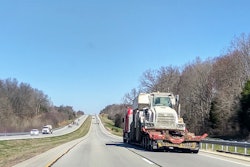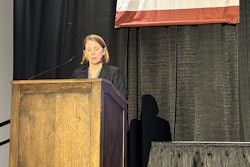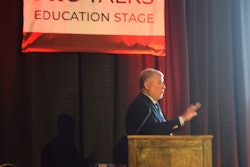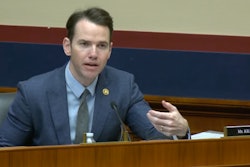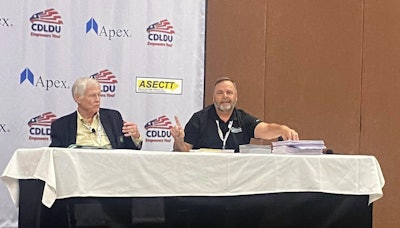
While FMCSA plans a massive audit of its 800,000 registered entities in an attempt to extinguish the spreading wildfire of double brokering and freight fraud, a recent deep dive into the pool of current registrants grants a shocking look at just how intense trucking's crime problem has become.
Dale Prax, a broker turned freight fraud vigilante, and Hank Seaton, a transportation attorney consulted in past on numerous different subjects (including fraud) in Overdrive, spoke about the extent of the freight fraud problem on Friday, March 22, at the Mid-America Trucking Show.
The talk, presented by CDL Drivers Unlimited and Seaton and other groups' Alliance for Safe, Efficient, and Competitive Truck Transportation (ASECTT), took place just one day after FMCSA's major announcement, and just a few doors down the hall.
In May of last year, Overdrive reported on Prax's work uncovering obvious violations within FMCSA's registration system, including hundreds of carriers and other entities registered to single principal places of business (PPOB), and 300 or so actually mocking the regulator with "[email protected]" listed as their contact email address. Prax initially uncovered that particular issue, and since that time he hasn't let off the throttle.

To start the presentation, Prax introduced himself as former Marine Corps inspector with an eye for fraud, and with perspective on FMCSA's lack of vetting for carriers and brokers -- and more outrageous, dysfunctional activity occurring right under FMCSA's nose.
"Everyone needs to realize how easy it is to get motor carrier authority," said Prax. "All you need is $300 on a Visa gift card you can buy at Walmart."
Then you need a VIN number.
A potential fraudster "can live in any country and get an VIN number off a truck in a junkyard and a crooked insurance agent, of which there are plenty, will write you an insurance policy because they know you're never going to be in an accident and never have a cargo claim," he said. "To become a barber in the state of Tennessee I'd need to go through 1,500 hours of training, sit for an eight-hour exam, and make sure I'm not in debt to the school. My question to the government is: Do you care more about bad haircuts or safety on the roads?"
Prax's digging in the FMCSA entity-registration database has uncovered hundreds of potential fraudsters taking advantage of lax requirements. Although many of the incomplete or error-ridden profiles in the system likely belong to honest motor carriers based in the U.S. who simply made mistakes in their filings (or their third-party agents did), the loopholes here are big enough to drive a truck through. Or thousands of trucks, according to Prax.
In April 2023, he set up an automated tool to quickly find any newly registered carrier "using a P.O. Box, a virtual address, a Staples store, Mailboxes Etc. or UPS store" as their principal place of business, he said.
The result was some 1,100 carriers registering with a principal place of business in direct violation of FMCSA regulations. Recall: Carriers are required to have a physical addresses on file where they keep safety paperwork and other important documentation for FMCSA audits. How could FMCSA possibly perform a new entrant audit on carriers with a fake address?
Not only did Prax clock the incoming authorities with bad PPOBs, he reached out. Each one got a letter from him explaining the violation, and each one generated a letter to FMCSA protesting the authority within the 10-day protest period.
In the end, about one third "just didn't go any further," with no insurance or BOC3 filing activating the authority, Prax said. Another third got an MC authority anyway, despite Prax's letter and details of the clear violation. The final third got in touch with Prax, claiming they didn't know or understand the process. Prax responded to them with instructions on how to correctly record their PPOB and why it must be done. The last, at least, acted like real carriers, and Prax said he was happy to assist them.
On the broker side, things get even more bleak.
Prax said FMCSA's system has about 22,000 broker authorities at present, according to his count. "Of those, 6,698 don’t have a contact name. 7,090 don’t have an email contact. 611 have no contact phone number," he said. "Why that's important is because if a guy gets a load from a broker, where does he go to make sure the broker is a good guy? He can look at [the FMCSA's SAFER website], but there's no name in there, no email address. He's got to have somewhere to check."
Even worse, as Prax and Seaton pointed out, "brokers don't have to go through new entrant audits."
In the carrier population, of about 325,000 active entities in FMCSA's system, only 130 didn't have a contact name. That's just .04%. On the broker side, that number jumps to more than 30%, Prax found.
There are some clues in the data as well that this isn't just happenstance, and some people, legitimate actors or not, have had a bit of fun playing with FMCSA's registration system.
"The other thing is that brokers don't list phone numbers, but when they do, guess what the most popular phone number is? 123-456-7890. The next is 111-111-1111. My favorite phone number," used for 50 companies by his count, "is 555-867-5309. Remember Jenny? Well Jenny is working in a lot of places right now."
FMCSA's registration-system overhaul -- 'step in the right direction,' but maybe too late
Attorney Hank Seaton also has personal experience with the agency's registration system. He operates a a BOC3 blanket company for trucking outfits.
"My pet peeve is that I run a service of process company," said Seaton. "All these people are doing it for dirt cheap and they don’t have actual agents, and the FMCSA called them at it and made them all renew, but these were all these dead men walking in the mailboxes, so they didn’t do anything except put some carriers out of business." Seaton was referencing the recent purge of BOC-3 agents from FMCSA's system, which resulted in an unknown number of motor carriers without a BOC3 agent and thus subject to authority revocation proceedings.
[Related: FMCSA's authority revocation anomaly: BOC3 blanket companies cleared out]
Beyond zombie mailing addresses and joke phone numbers lurks real horror. Freight fraud really did jump 400% from the end of 2022 to the end of 2023, according to Truckstop, among others who've charted the increase since freight markets got loose and crooks began plying their "trade" in ever greater numbers mid-2022 and on.
Overall, Prax and Seaton both agree FMCSA's recent overhaul to the registration system was a "step in the right direction," though the timeline the agency set for October 2025 sounded "aggressive" for government work, Prax stressed. That is, it might be unrealistic for owner-operators and carriers to expect the agency to meet their own deadlines.
At the same time, FMCSA's plan to contract for "industry-leading" tech tools to verify identities and businesses during registration, if successful, might well address some of the loopholes Prax identified. But a certain corporate criminal element has, no doubt, grown accustomed to feeding on the spot market.
Prax said he's identified an individual based in the Central Asian nation of Uzbekistan who runs a ring of 14 companies that book and then double-broker loads amongst themselves and others. (Read more about how these double-brokering schemes often play out via this link.) Each of this person's filings indicated that they were a U.S. citizen with no affiliations to any other carriers.
"This person is working out of Uzbekistan collecting money from our hardworking truckers," said Prax.
Ultimately, under current practice, Seaton said, "FMCSA-approved does not mean FMCSA-compliant." FMCSA contends it's "concerned about fraud, but never investigated a broker, which really doesn’t meet safety compliance standards, or common sense."
In presentations that were part of the CDL Drivers Unlimited/ASECTT series at MATS the day prior, Seaton and others outlined a proposal that might both help legitimate small carriers and owner-operators more readily achieve a safety rating and also stamp out fraud within the carrier/broker-registration system. “The agency should adopt a new carrier/broker audit, a kind of prerequisite to issuing authority for a carrier or broker,” he said, modeled on the current New Entrant Audit program for carriers but conducted before authority is granted, not after. Including applicant brokers in that mix, too.
[Related: FMCSA updates on AEBs, broker transparency -- no mention of safety ratings]
The threat-level is high from organized fraudsters, sometimes rising beyond just financial in nature, too, Seaton said. Criminal elements that prey on the weak in the spot market "get really nasty" when confronted, he said. "I had a client" who got a message from a double broker "with a picture of him and his wife and kid from the Internet and a message that said something like 'Nice family. They wouldn't want to know how you're treating me.'
"Threats of bodily injury raise this to another angle entirely. Unfortunately, it falls particularly hard on small carriers," he added of the threat from double brokering, whether from actual violence or something as simple as a bad review on Carrier 411 or another service.
Prax, through his new vetting tool FreightValidate, hopes to help shippers and carriers dig up these vital signs for broker filings with an interface that's as simple to use as hailing Siri or Alexa and asking about an MC number.
Meanwhile, Seaton said he would continue his advocacy work to turn up the heat on Washington, and urged drivers of all stripes to act as "boots on the ground" in collaborating with CDLDU and ASECTT, sharing their experience, and banding together.
"We need to realize that we're an endangered species," said Seaton. "The government we've got is paying off everyone's college education, and meanwhile you’re suffering because they won’t do their job. There's not a cop on the block."
[Related: Senators, Reps push to establish 'cop on the block' to counter double brokering, other freight fraud]

